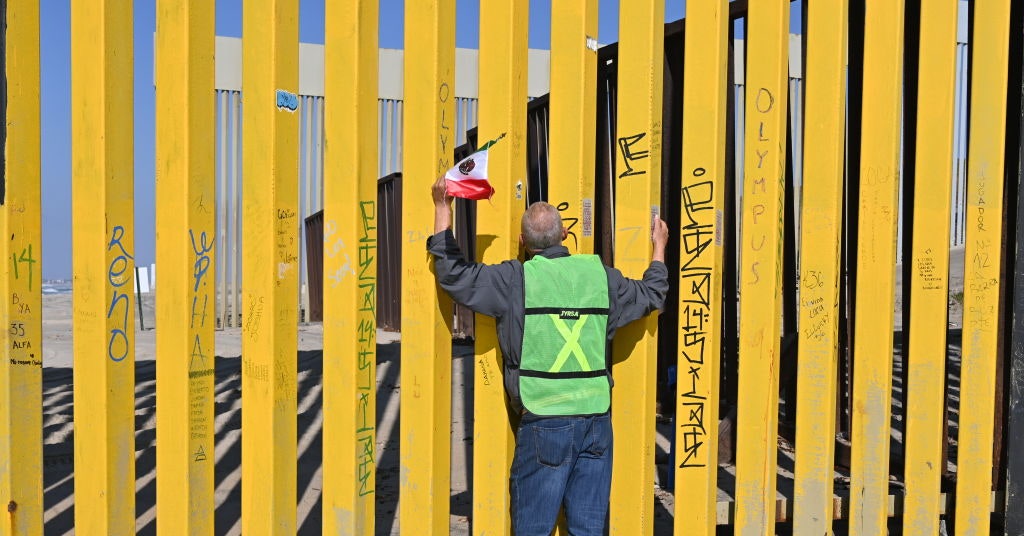The MexicoEmbracesYou Program: A Program to Help Migrants Embrace Your Country in the U.S. Through the Closure of the CBP One App
Minutes after Mr. Trump took the oath of office, his team disabled CBP One, a government program that allowed migrants to secure appointments to enter the country. The Biden administration used the first iteration of the phone app developed by the Trump administration to provide a safe way to cross land borders into the country without having to risk their lives.
In another “Securing Our Borders” directive, Mr. Trump canceled a Biden-era program that allowed people from Cuba, Haiti, Nicaragua and Venezuela to apply for humanitarian parole on the condition that an American pledged to provide the applicant with financial support. If the migrants from these countries, experiencing humanitarian crises, qualified for the program, they would fly into the United States and stay for two years, with permission to work. While in the country, they could apply for asylum or other benefits. More than half a million people entered the country through the initiative last year.
Deactivating the program on Monday sent some 30,000 migrants with existing appointments into limbo, and left them and future migrants without an orderly way to come into the country.
The Migrant Protection Protocols, which was created during Mr. Trump’s first term, is being reintroduced as a result of his “Securing Our Borders” order. It puts migrants in Mexico as an American immigration judge makes a decision on their case.
The MexicoEmbracesYou program is a government initiative to help Mexicans deported from the United States. This measure was taken in response to the strict immigration policy announced by President Donald Trump on January 20, and which has already begun to unfold with the closure of the CBP One app.
Rosa Icela Rodríguez, head of the Ministry of the Interior (SEGOB), unveiled the project during the morning conference of Mexico’s president, Claudia Sheinbaum. Rodríguez explained that the strategy includes economic support of 2,000 pesos (about $100) for Mexican citizens who lack the resources to return to their communities of origin. The Bienestar Paisano Card will be used for this support.
The plan is to allow Mexican migrants to be a part of existing social programs, such as pensions for senior citizens and people with disabilities, according to federal authorities.
Repatriated Mexicans will be affiliated with the Mexican Social Security Institute. The program will grant them access to insurance for sickness and maternity, work risks, disability and life, retirement, and for severance in advanced age and old age. The Social Security Law will allow them to enjoy all of the benefits. The benefits will be given to the family of the deportee.
Mexicans who have been deported from the US will receive legal advice about obtaining valid identification such as voter’s credentials, birth certificates, and Clave nica de Registro de Poblacin. The National Workers’ Housing Fund Institute gives access to social housing support, along with the Ministry of Agrarian, Territorial, and Urban Development.
In his inaugural address, Donald Trump confirmed that he will declare a state of emergency on the Mexican border to stop illegal immigrants. He promised to act with historic speed. His statements are starting to take effect.
Juan Ramón de la Fuente, secretary of foreign affairs, announced the creation of the ConsulApp platform. The system will have three essential functions: alerting the nearest Mexican consulate to initiate legal assistance in real time, notifying family members or trusted contacts selected by the migrant about his or her legal situation, and directly warning the Foreign Ministry, which will supervise compliance with due process.
Sheinbaum anticipated its closure in a statement from the SEGOB, published before Trump’s inauguration. She said that “this application has helped migrants not have to go to the northern border to wait for asylum. We are going to propose that this application or other related ones be allowed.”
Migrantis and the Mexican Economy: Addressing the Problem of Immigrants through Mexican Consulates in the Embassies of the United States
The Mexican president emphasized that migrants are essential to the economy, and reaffirmed her support to Mexican nationals through the 53 consulates throughout the United States.
